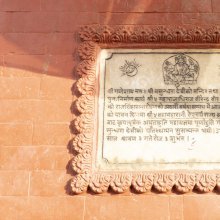Vikrama: 28 definitions
Introduction:
Vikrama means something in Buddhism, Pali, Hinduism, Sanskrit, Jainism, Prakrit, the history of ancient India, Marathi, Hindi. If you want to know the exact meaning, history, etymology or English translation of this term then check out the descriptions on this page. Add your comment or reference to a book if you want to contribute to this summary article.
Images (photo gallery)
In Hinduism
Purana and Itihasa (epic history)
Source: Cologne Digital Sanskrit Dictionaries: The Purana IndexVikrama (विक्रम).—A god of the ten branches of the Sukarmāṇa group of devas.*
- * Brahmāṇḍa-purāṇa IV. 1. 88; Vāyu-purāṇa 100. 93.
Vikrama (विक्रम) is a name mentioned in the Mahābhārata (cf. IX.44.33) and represents one of the many proper names used for people and places. Note: The Mahābhārata (mentioning Vikrama) is a Sanskrit epic poem consisting of 100,000 ślokas (metrical verses) and is over 2000 years old.

The Purana (पुराण, purāṇas) refers to Sanskrit literature preserving ancient India’s vast cultural history, including historical legends, religious ceremonies, various arts and sciences. The eighteen mahapuranas total over 400,000 shlokas (metrical couplets) and date to at least several centuries BCE.
Jyotisha (astronomy and astrology)
Source: Wisdom Library: Brihat Samhita by VarahamihiraVikrama (विक्रम) refers to the fourteenth of the sixty-year cycle of Jupiter, according to the Bṛhatsaṃhitā (chapter 8), an encyclopedic Sanskrit work written by Varāhamihira mainly focusing on the science of ancient Indian astronomy astronomy (Jyotiṣa).—Accordingly, “The five years of the third yuga sacred to Indra are known as—1. Īśvara, 2. Bahudhānya, 3. Pramāthin, 4. Vikrama and 5. Vṛṣa. In the first two years mankind will enjoy the happiness of Kṛtayuga. In the year Pramāthin they will feel miserable but in the years Vikrama and Vṛṣa they will again be happy”.
Source: The effect of Samvatsaras: SatvargasVikrama (विक्रम) refers to the fourteenth saṃvatsara (“jovian year)” in Vedic astrology.—The native who is born during the ‘samvatsara’ of ‘vikrama’ remains engaged in doing extremely terrible or fierce deeds, is skilled in attacking the enemy’s army, is a warrior or champion, has patience and endurance, is extremely generous and valorous or powerful.
According with Jataka Parijata, the person born in the year vikrama (2000-2001 AD) will be wealthy and valiant and command an army.

Jyotisha (ज्योतिष, jyotiṣa or jyotish) refers to ‘astronomy’ or “Vedic astrology” and represents the fifth of the six Vedangas (additional sciences to be studied along with the Vedas). Jyotisha concerns itself with the study and prediction of the movements of celestial bodies, in order to calculate the auspicious time for rituals and ceremonies.
Vyakarana (Sanskrit grammar)
Source: Wikisource: A dictionary of Sanskrit grammarVikrama (विक्रम).—(l) name given to a grave vowel placed between two circumflex vowels, or between a circumflex and an acute, or between an acute and a circumflex; cf. स्वरितयोर्मध्ये यत्र नीचं स्यात्, उदात्तयोर्वा अन्यतरतो वा उदात्तस्वरितयोः स विक्रमः (svaritayormadhye yatra nīcaṃ syāt, udāttayorvā anyatarato vā udāttasvaritayoḥ sa vikramaḥ) T.Pr. XIX.I ; (2) name given to a grave vowel between a pracaya vowel and an acute or a circumflex vowel; cf. प्रचयपूर्वश्च कौण्डिन्यस्य (pracayapūrvaśca kauṇḍinyasya) T.Pr.XIX.2; (8) repetition of a word or पद (pada) as in the Krama recital of the Veda words; (4) name given to a visarjaniya which has remained intact, as for instance in यः प्राणतो निमिषतः (yaḥ prāṇato nimiṣataḥ) ; cf. R.Pr. I.5; VI.1 ; the word विक्रम (vikrama) is sometimes used in the sense of visarjaniya in general; cf.also अनिङ्गयन् विक्रममेषु कुर्यात् (aniṅgayan vikramameṣu kuryāt) R.Pr. XIII.11.

Vyakarana (व्याकरण, vyākaraṇa) refers to Sanskrit grammar and represents one of the six additional sciences (vedanga) to be studied along with the Vedas. Vyakarana concerns itself with the rules of Sanskrit grammar and linguistic analysis in order to establish the correct context of words and sentences.
Kavya (poetry)
Source: Wisdom Library: KathāsaritsāgaraVikrama (विक्रम) is the name of a Vidyādhara who fought on Śrutaśarman’s side in the war against Sūryaprabha, according to the Kathāsaritsāgara, chapter 48. Accordingly: “... when Śrutaśarman saw that, he quickly sent other ten lords of the Vidyādharas, chiefs of lords of hosts or lords of hosts of warriors,... and Vikrama [and seven others], the eight similar sons of the Vasus born in the house of Makaranda”.
The story of Vikrama was narrated by the Vidyādhara king Vajraprabha to prince Naravāhanadatta in order to relate how “Sūryaprabha, being a man, obtain of old time the sovereignty over the Vidyādharas”.
The Kathāsaritsāgara (‘ocean of streams of story’), mentioning Vikrama, is a famous Sanskrit epic story revolving around prince Naravāhanadatta and his quest to become the emperor of the vidyādharas (celestial beings). The work is said to have been an adaptation of Guṇāḍhya’s Bṛhatkathā consisting of 100,000 verses, which in turn is part of a larger work containing 700,000 verses.

Kavya (काव्य, kavya) refers to Sanskrit poetry, a popular ancient Indian tradition of literature. There have been many Sanskrit poets over the ages, hailing from ancient India and beyond. This topic includes mahakavya, or ‘epic poetry’ and natya, or ‘dramatic poetry’.
Vaishnavism (Vaishava dharma)
Source: Pure Bhakti: Arcana-dipika - 3rd EditionVikrama (विक्रम) is the fourteenth of sixty years (saṃvatsara) in the Vedic lunar calendar according to the Arcana-dīpikā by Vāmana Mahārāja (cf. Appendix).—Accordingl, There are sixty different names for each year in the Vedic lunar calendar, which begins on the new moon day (Amāvasyā) after the appearance day of Śrī Caitanya Mahāprabhu (Gaura-pūrṇimā), in February or March. The Vedic year [viz., Vikrama], therefore, does not correspond exactly with the Christian solar calendar year.

Vaishnava (वैष्णव, vaiṣṇava) or vaishnavism (vaiṣṇavism) represents a tradition of Hinduism worshipping Vishnu as the supreme Lord. Similar to the Shaktism and Shaivism traditions, Vaishnavism also developed as an individual movement, famous for its exposition of the dashavatara (‘ten avatars of Vishnu’).
Shaktism (Shakta philosophy)
Source: Google Books: ManthanabhairavatantramVikrama (विक्रम) refers to one of the male servants associated with Pūrṇagiri, one of the sacred seats (pīṭha), according to the Manthānabhairavatantra, a vast sprawling work that belongs to a corpus of Tantric texts concerned with the worship of the goddess Kubjikā.—Nine of the twelve female servants (three in each of the first four seats), are low-caste women who we find, in other contexts, embody the Mothers (mātṛkā). The maids (cellakā) are Yoginīs and the servants their male counterparts [i.e., Vikrama]. These replace the spiritual ‘sons’ and ‘daughters’ the goddess generates and the guardians she appoints in the sacred seats listed in the ‘Kubjikāmatatantra’.

Shakta (शाक्त, śākta) or Shaktism (śāktism) represents a tradition of Hinduism where the Goddess (Devi) is revered and worshipped. Shakta literature includes a range of scriptures, including various Agamas and Tantras, although its roots may be traced back to the Vedas.
Sports, Arts and Entertainment (wordly enjoyments)
Source: archive.org: Syainika Sastra of Rudradeva with English Translation (art)Vikrama (विक्रम) refers to the “strength” (of a particular class of Hawks), according to the Śyainika-śāstra: a Sanskrit treatise dealing with the divisions and benefits of Hunting and Hawking, written by Rājā Rudradeva (or Candradeva) in possibly the 13th century.—Accordingly, [while discussing the yellow-eyed division of hawks]: “There are four kinds of Vāsa. [...] Auraṅganās are of various kinds, varying in colours and in their courage (vikrama) and strength”.

This section covers the skills and profiencies of the Kalas (“performing arts”) and Shastras (“sciences”) involving ancient Indian traditions of sports, games, arts, entertainment, love-making and other means of wordly enjoyments. Traditionally these topics were dealt with in Sanskrit treatises explaing the philosophy and the justification of enjoying the pleasures of the senses.
In Buddhism
Tibetan Buddhism (Vajrayana or tantric Buddhism)
Source: OSU Press: Cakrasamvara SamadhiVikrama (विक्रम) or Vikrameśvara refers to one of the “eight passionless ones” (Aṣṭavaitarāga or Aṣṭavītarāga), according to the Guru Mandala Worship (maṇḍalārcana) ritual often performed in combination with the Cakrasaṃvara Samādhi, which refers to the primary pūjā and sādhanā practice of Newah Mahāyāna-Vajrayāna Buddhists in Nepal.

Tibetan Buddhism includes schools such as Nyingma, Kadampa, Kagyu and Gelug. Their primary canon of literature is divided in two broad categories: The Kangyur, which consists of Buddha’s words, and the Tengyur, which includes commentaries from various sources. Esotericism and tantra techniques (vajrayāna) are collected indepently.
Mahayana (major branch of Buddhism)
Source: De Gruyter: A Buddhist Ritual Manual on AgricultureVikrama (विक्रम) refers to “(frightful) power”, according to the Vajratuṇḍasamayakalparāja, an ancient Buddhist ritual manual on agriculture from the 5th-century (or earlier), containing various instructions for the Sangha to provide agriculture-related services to laypeople including rain-making, weather control and crop protection.—Accordingly, “Now the Bhagavān was residing in the abode of Brahmā. [...] [There was] the Garuḍa Lord, the Great King, the one with golden wings, the one with a Vajra Beak, the magnanimous one, the one with a blazing body, the wrathful one, the one of frightful power (bhīma-vikrama). He was adorned with various wonderful gems, pearls and gold. [...]”.

Mahayana (महायान, mahāyāna) is a major branch of Buddhism focusing on the path of a Bodhisattva (spiritual aspirants/ enlightened beings). Extant literature is vast and primarely composed in the Sanskrit language. There are many sūtras of which some of the earliest are the various Prajñāpāramitā sūtras.
In Jainism
General definition (in Jainism)
Source: The University of Sydney: A study of the Twelve ReflectionsVikrama (विक्रम) refers to “power”, according to the 11th century Jñānārṇava, a treatise on Jain Yoga in roughly 2200 Sanskrit verses composed by Śubhacandra.—Accordingly, “When Yama is an opponent of embodied souls, all elephants, horses, men, and soldiers and the powers of mantras and medicines become useless. While any person does not hear the merciless roaring of Yama’s lion, in that time he leaps about having pleasure in only [his own] power (vikrama—vikramaikarasaḥ)”.
Source: academia.edu: Tessitori Collection I1) Vikrama (विक्रम) or Vikramasūri is the name of a teacher mentioned in the Bṛhadgaccha-gurvāvalī (dealing with Jain lineages history) (in Sanskrit/Prakrit/Gujarati), which is included in the collection of manuscripts at the ‘Vincenzo Joppi’ library, collected by Luigi Pio Tessitori during his visit to Rajasthan between 1914 and 1919.—The information provided by the Bṛhadgacchagurvāvalī for the teachers [e.g., Vikrama-sūri] includes their literary achievements, reference to installation of images, and, the case arising, their feats in debates with non-Jains. [...]
2) Vikrama (विक्रम) or Vikramasūri is the name of a teacher belonging to the añcala-gaccha, according to the Añcalagaccha-paṭṭāvalī (dealing with Jain lineages history).

Jainism is an Indian religion of Dharma whose doctrine revolves around harmlessness (ahimsa) towards every living being. The two major branches (Digambara and Svetambara) of Jainism stimulate self-control (or, shramana, ‘self-reliance’) and spiritual development through a path of peace for the soul to progess to the ultimate goal.
India history and geography
Source: OpenEdition books: Vividhatīrthakalpaḥ (History)Vikrama (विक्रम) is another name for king Vikramāditya, as is mentioned in the Vividhatīrthakalpa by Jinaprabhasūri (13th century A.D.): an ancient text devoted to various Jaina holy places (tīrthas).—Vikramāditya is also known as Avantinareśitṛ, Avantipati, Avantīśitr, Mālaveśa and Vikrama.

The history of India traces the identification of countries, villages, towns and other regions of India, as well as mythology, zoology, royal dynasties, rulers, tribes, local festivities and traditions and regional languages. Ancient India enjoyed religious freedom and encourages the path of Dharma, a concept common to Buddhism, Hinduism, and Jainism.
Languages of India and abroad
Marathi-English dictionary
Source: DDSA: The Molesworth Marathi and English Dictionaryvikrama (विक्रम).—m (S) Heroism, prowess, puissance, valor. 2 or vikramāditya m (S) The name of a prince, the sovereign of Ougein, and reputed founder of an era which commenced fifty-six years before the Christian. There have been many princes of this name.
Source: DDSA: The Aryabhusan school dictionary, Marathi-Englishvikrama (विक्रम).—m Heroism. The name of a prince.
Marathi is an Indo-European language having over 70 million native speakers people in (predominantly) Maharashtra India. Marathi, like many other Indo-Aryan languages, evolved from early forms of Prakrit, which itself is a subset of Sanskrit, one of the most ancient languages of the world.
Sanskrit dictionary
Source: DDSA: The practical Sanskrit-English dictionaryVikrama (विक्रम).—1 A step, stride, pace; गतेषु लीलाञ्चितविक्रमेषु (gateṣu līlāñcitavikrameṣu) Kumārasambhava 1.34; Ś.7.6; निष्पेषवन्त्यायतविक्रमाणि (niṣpeṣavantyāyatavikramāṇi) (saptapadāni) Bu. Ch.1.33; Mahābhārata (Bombay) 7.49.5; cf. त्रिविक्रम (trivikrama).
2) Stepping over, walking; going, gait; ततः सुमन्त्रस्त्वरितं गत्वा त्वरितविक्रमः (tataḥ sumantrastvaritaṃ gatvā tvaritavikramaḥ) Rām.1.8.5; गतैः सहावैः कलहंसविक्रमम् (gataiḥ sahāvaiḥ kalahaṃsavikramam) Kirātārjunīya 8.29.
3) Overcoming, overpowering.
4) Heroism, prowess, heroic valour; अनुत्सेकः खलु विक्रमालंकारः (anutsekaḥ khalu vikramālaṃkāraḥ) V.1; R.12.87, 93.
5) Name of a celebrated king of Ujjayinī.
6) Name of Viṣṇu.
7) Strength, power.
8) Intensity.
9) Stability.
1) A kind of grave accent.
11) Non-change of the विसर्ग (visarga) into an उष्मन् (uṣman).
12) The third astrological house.
Derivable forms: vikramaḥ (विक्रमः).
Source: Cologne Digital Sanskrit Dictionaries: Edgerton Buddhist Hybrid Sanskrit DictionaryVikrama (विक्रम).—(1) nt. (for Sanskrit m.), valor: °maṃ, n. sg., Mahāvastu i.78.16, as one of 8 samudācāra (q.v., 1); (2) foot (so Sanskrit Lex.), or footstep (compare the meaning step, stride in Sanskrit): govikrama-saṃsthānaṃ, shaped like a cow's foot(-step), Divyāvadāna 640.19, of the Pūrvāṣāḍha-nakṣatra; so gaja-vikrama- saṃsthānaṃ 21, of the Uttarāṣāḍhanakṣatra.
Source: Cologne Digital Sanskrit Dictionaries: Shabda-Sagara Sanskrit-English DictionaryVikrama (विक्रम).—m.
(-maḥ) 1. Heroism, prowess, heroic valour. 2. Great power or strength. 3. Walking, going, proceeding. 4. Overpowering, overcoming. 5. Strength in general. 6. A step, a stride, (as in trivikrama .) 7. The name of a sovereign of Ougein: see vikramāditya. E. vi before, kram to go, to move, to walk, aff. ac .
Source: Cologne Digital Sanskrit Dictionaries: Benfey Sanskrit-English DictionaryVikrama (विक्रम).—[vi-kram + a], m. 1. A step, [Johnson's Selections from the Mahābhārata.] 95, 67; [Śākuntala, (ed. Böhtlingk.)] [distich] 165. 2. Proceeding. [Mānavadharmaśāstra] 3, 214 (v. r.). 3. Overpowering. 4. Great strength, [Johnson's Selections from the Mahābhārata.] 48, 82. 5. Strength, [Hitopadeśa] ii. [distich] 84 (with kṛ, To use one’s strength). 6. Heroism, [Vikramorvaśī, (ed. Bollensen.)] 11, 12; [Pañcatantra] ii. [distich] 146; in the title of the drama, vikramorvaśī, i. e. vikrama-urvaśi, f. Urvaśī, gained by heroism. 7. A proper name.
Source: Cologne Digital Sanskrit Dictionaries: Cappeller Sanskrit-English DictionaryVikrama (विक्रम).—[masculine] step, stride, going, gait; bold advance, valour, might.
--- OR ---
Vikrāma (विक्राम).—[masculine] a step’s width.
Source: Cologne Digital Sanskrit Dictionaries: Aufrecht Catalogus CatalogorumVikrama (विक्रम) as mentioned in Aufrecht’s Catalogus Catalogorum:—son of Sāṅgaṇa: Nemidūta kāvya.
Source: Cologne Digital Sanskrit Dictionaries: Monier-Williams Sanskrit-English Dictionary1) Vikrama (विक्रम):—[=vi-krama] [from vi] 1. vi-krama m. (for 2. See vi-√kram) the absence of the Krama-pāṭha (q.v.), [Ṛgveda-prātiśākhya]
2) [=vi-krama] [from vi-kram] 2. vi-krama m. (for 1. See p. 950, col. 1) a step, stride, pace, [Śatapatha-brāhmaṇa] etc. etc.
3) [v.s. ...] going, proceeding, walking, motion, gait, [Mahābhārata; Kāśikā-vṛtti] etc.
4) [v.s. ...] course, way, manner (anukrama-vikrameṇa = anukrameṇa, in regular order), [Mahābhārata]
5) [v.s. ...] valour, courage, heroism, power, strength, [ib.; Kāvya literature] etc. (maṃ-√kṛ, to display prowess, use one’s strength)
6) [v.s. ...] force, forcible means, [ib.] (māt ind. by force; nāsti vikrameṇa, it cannot be done by force)
7) [v.s. ...] intensity, high degree, [Varāha-mihira’s Bṛhat-saṃhitā]
8) [v.s. ...] stability, duration (opp. to ‘cessation’), [Bhāgavata-purāṇa]
9) [v.s. ...] a kind of grave accent, [Taittirīya-prātiśākhya]
10) [v.s. ...] non-change of the Visarga into an Ūṣman, [Ṛgveda-prātiśākhya]
11) [v.s. ...] the 14th year in the 60 years cycle of Jupiter, [Varāha-mihira’s Bṛhat-saṃhitā]
12) [v.s. ...] the 3rd astrological house, [ib.]
13) [v.s. ...] a foot, [cf. Lexicographers, esp. such as amarasiṃha, halāyudha, hemacandra, etc.]
14) [v.s. ...] Name of Viṣṇu, [Mahābhārata]
15) [v.s. ...] of the son of Vasu, [Kathāsaritsāgara]
16) [v.s. ...] of a son of Vatsa-prī, [Mārkaṇḍeya-purāṇa]
17) [v.s. ...] of a son of Kanaka, [Catalogue(s)]
18) [v.s. ...] of various authors (also with bhaṭṭa), [Catalogue(s)]
19) [v.s. ...] = candragupta, [ib.]
20) [v.s. ...] = vikramāditya, [Pañcadaṇḍacchattra-prabandha]
21) [v.s. ...] Name of a town, [Catalogue(s)]
22) Vikrāma (विक्राम):—[=vi-krāma] [from vi-krānti > vi-kram] m. a step’s width, [Taittirīya-brāhmaṇa]
Source: Cologne Digital Sanskrit Dictionaries: Yates Sanskrit-English DictionaryVikrama (विक्रम):—[vi-krama] (maḥ) 1. m. Heroism, prowess, strength; overcoming; going; a king of Oujein.
Source: DDSA: Paia-sadda-mahannavo; a comprehensive Prakrit Hindi dictionary (S)Vikrama (विक्रम) in the Sanskrit language is related to the Prakrit word: Vikkama.
[Sanskrit to German]
Sanskrit, also spelled संस्कृतम् (saṃskṛtam), is an ancient language of India commonly seen as the grandmother of the Indo-European language family (even English!). Closely allied with Prakrit and Pali, Sanskrit is more exhaustive in both grammar and terms and has the most extensive collection of literature in the world, greatly surpassing its sister-languages Greek and Latin.
Hindi dictionary
Source: DDSA: A practical Hindi-English dictionaryVikrama (विक्रम) [Also spelled vikram]:—(nm) heroism, valiance, valour; name of an ancient great king of Ujjain, founder of an era which commenced earlier than the Christian era (also known as [vikramāditya]).
...
Kannada-English dictionary
Source: Alar: Kannada-English corpusVikrama (ವಿಕ್ರಮ):—
1) [noun] a going; proceeding; walking.
2) [noun] a step, stride, pace.
3) [noun] a travelling; tours; journeys.
4) [noun] valour; courage; heroism.
5) [noun] a valorous man; a hero.
6) [noun] an incarnation of Viṣṇu, in which he trod the demon king Bali to pātāḷa, the world below the earth.
7) [noun] name of the fourteenth year in the Hindu cycle of sixty years.
8) [noun] name of a king of Ujjayini, the from the date of whose coronation, an era, named Vikrama Śaka is reckoned.
9) [noun] name of another king of Cālukya dynasty, who also started an era starting from his coronation10) [noun] the best performance, highest speed, greatest amount, highest rate, etc. achieved, esp. when officially recorded; a record.
11) [noun] one of the gaits of horses.
Kannada is a Dravidian language (as opposed to the Indo-European language family) mainly spoken in the southwestern region of India.
See also (Relevant definitions)
Starts with (+44): Vikrama bhatta, Vikramabahu, Vikramabda, Vikramabharata, Vikramacanda, Vikramacandrika, Vikramacarita, Vikramacaritra, Vikramachanda, Vikramadaridra, Vikramadeva, Vikramaditya, Vikramadityacarita, Vikramadityacaritra, Vikramadityakosha, Vikramadityaraja, Vikramahina, Vikramaka, Vikramakarman, Vikramakeshari.
Ends with (+51): Abhivikrama, Ajitavikrama, Amitavikrama, Amoghavikrama, Ashuvikrama, Ativikrama, Atyakhandalavikrama, Avikrama, Ayatavikrama, Badhavikrama, Bahivikrama, Bahuvikrama, Bhagavata trivikrama, Bhanavikrama, Bhimavikrama, Bhujavikrama, Bhurivikrama, Candavikrama, Candravikrama, Caruvikrama.
Full-text (+267): Vikramin, Vikramarka, Suvikrama, Vikramasenacampu, Trivikrama, Vikramatunga, Vikramopakhyana, Vikramarkacarita, Vikramarkacaritra, Kalavikrama, Uruvikrama, Vikramaditya, Satyavikrama, Anantavikramin, Ajitavikrama, Vikramapati, Vikramalanchana, Vikramasthana, Vikramaprabandha, Vikramacandrika.
Relevant text
Search found 65 books and stories containing Vikrama, Vikrāma, Vi-krama, Vi-krāma; (plurals include: Vikramas, Vikrāmas, kramas, krāmas). You can also click to the full overview containing English textual excerpts. Below are direct links for the most relevant articles:
Garga Samhita (English) (by Danavir Goswami)
Verse 2.13.24 < [Chapter 13 - The Story of Śeṣa]
Verse 8.9.9 < [Chapter 9 - Lord Balarāma’s Rāsa Dance]
Verse 2.14.14 < [Chapter 14 - Description of Kāliya’s Story]
The Agnistoma Somayaga in the Shukla Yajurveda (by Madan Haloi)
Part 3.1: Construction of the Mahāvedī < [Chapter 4 - The Agniṣṭoma Ritual]
Part 3.2: Construction of the Uttaravedī < [Chapter 4 - The Agniṣṭoma Ritual]
Shrimad Bhagavad-gita (by Narayana Gosvami)
Verse 11.40 < [Chapter 11 - Viśvarūpa-darśana-yoga (beholding the Lord’s Universal Form)]
Bhakti-rasamrta-sindhu (by Śrīla Rūpa Gosvāmī)
Verse 2.3.44 < [Part 3 - Involuntary Ecstatic Expressions (sattvika-bhāva)]
Verse 2.4.130 < [Part 4 - Transient Ecstatic Disturbances (vyābhicāri-bhāva)]
Cidgaganacandrika (study) (by S. Mahalakshmi)
Verse 84 [Gurukrama] < [Chapter 3 - Third Vimarśa]
Kathasaritsagara (the Ocean of Story) (by Somadeva)
Introductory Remarks (to the Vetālapañcaviṃśati) < [Appendix 6.1 - The Twenty-five Tales of a Vetāla]
Vetāla 20: The Brāhman Boy who offered himself up to save the Life of the King < [Appendix 6.1 - The Twenty-five Tales of a Vetāla]
Related products




